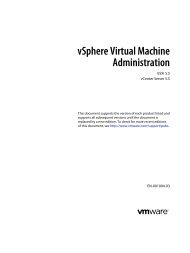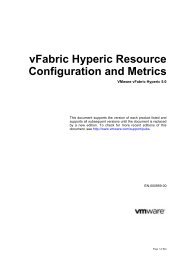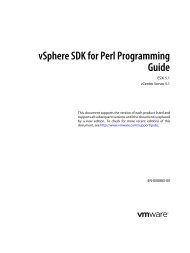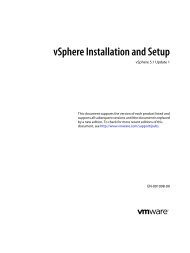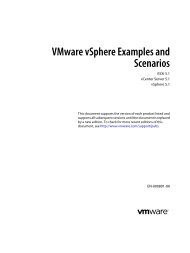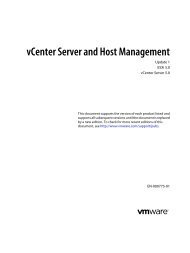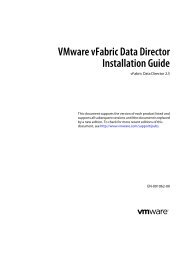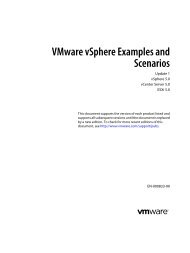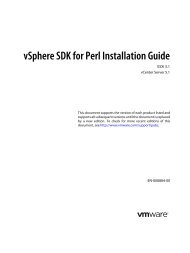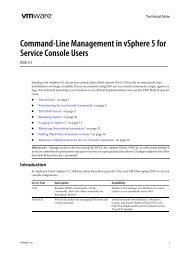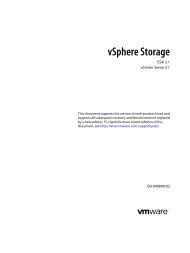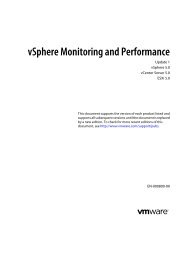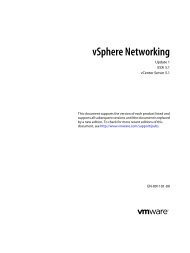vSphere Virtual Machine Administration - Documentation - VMware
vSphere Virtual Machine Administration - Documentation - VMware
vSphere Virtual Machine Administration - Documentation - VMware
You also want an ePaper? Increase the reach of your titles
YUMPU automatically turns print PDFs into web optimized ePapers that Google loves.
<strong>vSphere</strong> <strong>Virtual</strong> <strong>Machine</strong> <strong>Administration</strong><br />
The PCI and SIO virtual hardware devices are part of the virtual motherboard, but cannot be configured or<br />
removed.<br />
Table 1-2. <strong>Virtual</strong> <strong>Machine</strong> Hardware and Descriptions<br />
Hardware Device Description<br />
CPU You can configure a virtual machine that runs on an ESXi host to have one or more<br />
virtual processors. A virtual machine cannot have more virtual CPUs than the<br />
actual number of logical CPUs on the host. You can change the number of CPUs<br />
allocated to a virtual machine and configure advanced CPU features, such as the<br />
CPU Identification Mask and hyperthreaded core sharing.<br />
Chipset The motherboard uses <strong>VMware</strong> proprietary devices based on the following chips:<br />
n Intel 440BX AGPset 82443BX Host Bridge/Controller<br />
n Intel 82371AB (PIIX4) PCI ISA IDE Xcelerator<br />
n National Semiconductor PC87338 ACPI 1.0 and PC98/99 Compliant SuperI/O<br />
n Intel 82093AA I/O Advanced Programmable Interrupt Controller<br />
DVD/CD-ROM Drive Installed by default when you create a new <strong>vSphere</strong> virtual machine. You can<br />
configure DVD/CD-ROM devices to connect to client devices, host devices, or<br />
Datastore ISO files. You can add, remove, or configure DVD/CD-ROM devices.<br />
Floppy Drive Installed by default when you create a new <strong>vSphere</strong> virtual machine. You can<br />
connect to a floppy drive located on the ESXi host, a floppy (.flp) image, or the<br />
floppy drive on your local system. You can add, remove, or configure floppy<br />
devices.<br />
Hard Disk Stores the virtual machine's operating system, program files, and other data<br />
associated with its activities. A virtual disk is a large physical file, or a set of files,<br />
that can be copied, moved, archived, and backed up as easily as any other file.<br />
IDE 0, IDE 1 By default, two Integrated Drive Electronics (IDE) interfaces are presented to the<br />
virtual machine. The IDE interface (controller) is a standard way for storage<br />
devices (Floppy drives, hard drives and CD-ROM drives) to connect to the virtual<br />
machine.<br />
Keyboard Mirrors the keyboard that is connected to the virtual machine console when you<br />
first connect to the console.<br />
Memory The virtual hardware memory size determines how much memory applications<br />
that are running inside the virtual machine have available to them. A virtual<br />
machine cannot benefit from more memory resources than its configured virtual<br />
hardware memory size.<br />
Network Adapter ESXi networking features provide communication between virtual machines on<br />
the same host, between virtual machines on different hosts, and between other<br />
virtual and physical machines. When you configure a virtual machine, you can<br />
add network adapters (NICs) and specify the adapter type.<br />
Parallel port Interface for connecting peripherals to the virtual machine. The virtual parallel<br />
port can connect to a file. You can add, remove, or configure virtual parallel ports.<br />
PCI controller Bus on the virtual machine motherboard that communicates with components<br />
such as hard disks and other devices. One PCI controller is presented to the virtual<br />
machine. You cannot configure or remove this device.<br />
PCI Device You can add up to six PCI <strong>vSphere</strong> DirectPath devices to a virtual machine. The<br />
devices must be reserved for PCI passthrough on the host on which the virtual<br />
machine runs. Snapshots are not supported with DirectPath I/O passthrough<br />
devices.<br />
Pointing device Mirrors the pointing device that is connected to the virtual machine console when<br />
you first connect to the console.<br />
12 <strong>VMware</strong>, Inc.



